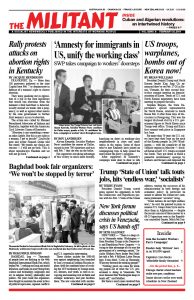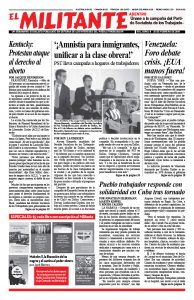BAGHDAD, Iraq — There has been widespread outcry here after the Feb. 2 murder of prominent Iraqi writer and novelist Alaa Mashzoub. He was gunned down as he was bicycling home from a writers’ gathering in his home city of Karbala. While police were quick to announce an investigation, so far no one has taken credit for the killing or been arrested.
Mashzoub was known for his opposition to foreign interference in Iraq and to the sectarian and corrupt politics in the country, as well as for his writings on the history of his home city, Karbala, which is one of Shiite Islam’s holiest centers. Mashzoub has also written about Iraq’s once-thriving community of Jews.
Mashzoub’s coffin was carried along a busy street in Karbala the day after his death. That same day, writers and artists staged a sit-in in the city. Dozens joined a march Feb. 6 to Tahrir Square in central Baghdad called by the Union of Iraqi Writers, holding pictures of Mashzoub alongside Iraqi flags.
Shortly before his assassination, Mashzoub had spoken out against interference in Iraq by the cleric-dominated regime in Iran, pointing out that its first leader, Ayatollah Khomeini, spent 13 years of his exile in Karbala prior to the 1979 Iranian Revolution. Mashzoub was killed by 13 bullets, a fact noted by many here.
The killing has triggered a faction struggle within the Tehran-sponsored Hashd al-Shaabi militias. Aws al-Khafaji, a commander of one of its brigades, who is related to Mashzoub, was arrested by other Hashd al-Shaabi forces and his headquarters ransacked after he said the killing was committed by “those who defend Iran in this country.”
These events reflect an ongoing struggle for domination in Iraq between U.S. imperialism and the counterrevolutionary regime in neighboring Iran. The Iraqi government has balked at Washington’s arrogant demands that it stop buying electricity and natural gas from Iran, its sole foreign supplier, to comply with U.S.-imposed sanctions. Baghdad fears that a disruption of power supplies would reignite working-class protests like those that shook the southern city of Basra in 2018 over the lack of clean water and Iranian interference in the country. Alaa Mashzoub had taken part in those protests.
Many Iraqi writers have spoken out against the assassination. “You really have to be a coward to fire a gun at someone who only has words and dreams,” novelist Ahmed Saadawi, author of the internationally acclaimed Frankenstein in Baghdad, wrote on Facebook. “Shame on the murderers — and shame on the authorities if they don’t find and bring them to justice immediately.”

